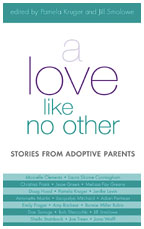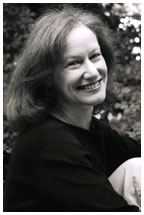November 2, 2005: Reading Room
Jill Smolowe ’77 deals with her charged feelings about cross-race adoptions in her new book. (Photo by ESME, courtesy Penguin Group) |
Making
a family
Jill Smolowe ’77 considers the complexities
adoptive parents face
By Maria LoBiondo
Plenty of books offer advice on how to adopt a child, but fewer tackle the tough issues that arise after you bring your child home. How do you handle feelings that you might have made a mistake, answer your child’s questions about the biological mother, or incorporate ethnic traditions for a child from another country?
Jill Smolowe ’77 and fellow journalist Pamela Kruger, both adoptive parents, knew they weren’t alone in dealing with these and other thorny topics. So they compiled the book they wanted to read: A Love Like No Other, published by Riverhead Books this month. The collection of 20 essays covers bonding and birth mothers, special needs and insensitive questions, personal setbacks and transformations. The book does not offer answers; Smolowe and Kruger, who contributed essays as well as coedited the book, want to offer affirmation and reassurance.
“We wanted to say to already adoptive parents, we really hope this book encourages dialogue and sharing,” says Smolowe. “To those in the adoptive process: This book will give you a taste of what lies ahead.”
 To
find the essayists, Smolowe, an associate editor at People magazine
after 15 years of international assignments for Newsweek and
Time, and Kruger, a contributing editor at Child magazine,
culled leads from their professional contacts and the adoption community’s
grapevine. All contributors are professional writers and adoptive parents
who share their personal experiences.
To
find the essayists, Smolowe, an associate editor at People magazine
after 15 years of international assignments for Newsweek and
Time, and Kruger, a contributing editor at Child magazine,
culled leads from their professional contacts and the adoption community’s
grapevine. All contributors are professional writers and adoptive parents
who share their personal experiences.
The essays describe rough spots and heartrending moments with humor and compassion. Readers may take comfort if they, like contributor Bonnie Miller Rubin, have been baffled by their child’s problems and blamed themselves when they couldn’t fix them. Or they may cheer as contributor Jacquelyn Mitchard fends off a reporter who asks, referring to her biological and adopted children, “Which ones are yours?”
In her 1997 memoir, An Empty Lap: One Couple’s Journey to Parenthood, Smolowe, a politics major at Princeton, recounted her infertility treatments, depression, and marital trauma before the adoption of her Chinese daughter.
In her new book, Smolowe deals with her charged feelings about cross-race adoptions in the essay, “Color Her Becky: Grappling with Race.” Smolowe examines how to honor and uphold her child’s heritage. She and her husband decided to allow their daughter to determine what role being Asian will play in her emerging sense of self, though many other families emphasize their children’s heritage and feel strongly that those parents who do not are remiss.
By editing A Love Like No Other, Smolowe says, she realized
that “adoption issues are not one-time events. Rather, they reemerge
in different ways at different stages as children mature and become more
able to reflect on the issues themselves.” ![]()
Maria LoBiondo is an occasional PAW contributor.
BOOK SHORTS
 The Columbia Anthology of Modern Japanese Literature: From Restoration
to Occupation, 1868--1945 — edited by J. Thomas Rimer ’54
and Van C. Gessel (Columbia). Divided into four chapters beginning with
texts of the 1870s, this anthology collects fiction, poetry, drama, and
essays. An introduction to each chapter situates the works within their
literary, political, and cultural contexts. Rimer is a professor of East
Asian languages and literatures at the University of Pittsburgh.
The Columbia Anthology of Modern Japanese Literature: From Restoration
to Occupation, 1868--1945 — edited by J. Thomas Rimer ’54
and Van C. Gessel (Columbia). Divided into four chapters beginning with
texts of the 1870s, this anthology collects fiction, poetry, drama, and
essays. An introduction to each chapter situates the works within their
literary, political, and cultural contexts. Rimer is a professor of East
Asian languages and literatures at the University of Pittsburgh.
 Confessions of a Park Avenue Plastic Surgeon — Cap Lesesne
’77 (Gotham Books). Part memoir, part inside scoop on the goings-on
of his Manhattan-based cosmetic surgery practice, Lesesne’s book
looks at why his patients — actors, models, politicians, and European
royalty — seek to “fix” their faces, tummies, and breasts.
He also talks about his childhood, Princeton, and his grueling medical
training. Included are tips on how to choose a plastic surgeon.
Confessions of a Park Avenue Plastic Surgeon — Cap Lesesne
’77 (Gotham Books). Part memoir, part inside scoop on the goings-on
of his Manhattan-based cosmetic surgery practice, Lesesne’s book
looks at why his patients — actors, models, politicians, and European
royalty — seek to “fix” their faces, tummies, and breasts.
He also talks about his childhood, Princeton, and his grueling medical
training. Included are tips on how to choose a plastic surgeon.
 Young Men and the Sea: Yankee Seafarers in the Age of Sail —
Daniel Vickers *81 with Vince Walsh (Yale). Drawing on records of several
thousand seamen and their voyages from Salem, Mass., the author offers
a social history of seafaring in America’s colonial and early national
period. Vickers looks at the sailors’ lives at sea and chances of
death, the women they married, and how their wives operated households
in their absence. Vickers is a history professor at the University of
California, San Diego.
Young Men and the Sea: Yankee Seafarers in the Age of Sail —
Daniel Vickers *81 with Vince Walsh (Yale). Drawing on records of several
thousand seamen and their voyages from Salem, Mass., the author offers
a social history of seafaring in America’s colonial and early national
period. Vickers looks at the sailors’ lives at sea and chances of
death, the women they married, and how their wives operated households
in their absence. Vickers is a history professor at the University of
California, San Diego. ![]()
By K.F.G.
For a complete list of books received, click here.

